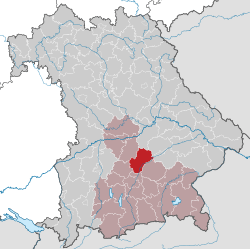Please tell us which country and city you'd like to see the weather in.

Freising
Freising is a town in Bavaria, Germany, and capital of the Freising district, with a total population of 45,227. The city is located north of Munich at the Isar river, near the Munich International Airport. Anyone taking off or landing at Munich airport can see the city to the north with its two hills, the cathedral hill with the bishop's castle and the Freising cathedral and Weihenstephan Hill with the oldest working brewery in the world.
Cultural significance
Freising is one of the oldest settlements in Bavaria, gaining importance by becoming a major religious center in the early Middle Ages. It was and still is the center of an important diocese. Some important historical documents were created between 900 to 1200 in its monastery:
The above and other scripts from that time can be found in the "Bayerische Staatsbibliothek" (Bavarian State Library) in Munich today.

Freising (district)
Freising is a district in Bavaria, Germany. Following a recent ranking of the German magazine FOCUS MONEY comparing all German districts it is number one concerning economic growth abilities. It is bounded by (from the north and clockwise) the districts of Kelheim, Landshut, Erding, Munich, Dachau and Pfaffenhofen. The district is located north of the Munich metropolitan area. The Isar and Amper rivers run in parallel from southwest to northeast. North of the rivers there is the Hallertau, a hilly region mainly used for hop growing.
History
In the Holy Roman Empire, Freising was a clerical state ruled by the bishops. In 1803, when the clerical states of Germany were dissolved, the region was annexed by Bavaria.
Coat of arms
The Freising Moor's head
This is a controversial charge in the Coat of Arms, which could represent one of many different persons:
- St. Mauritius
- St. Zeno
- St. Sigismund (mixed up with St. Mauritius)
Radio Stations - Freising
SEARCH FOR RADIOS
Podcasts:

